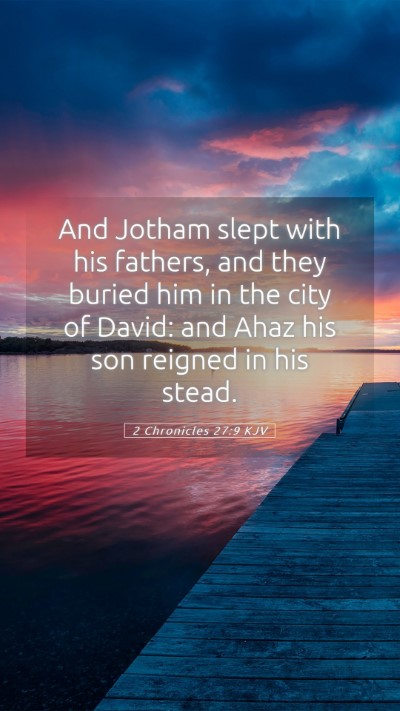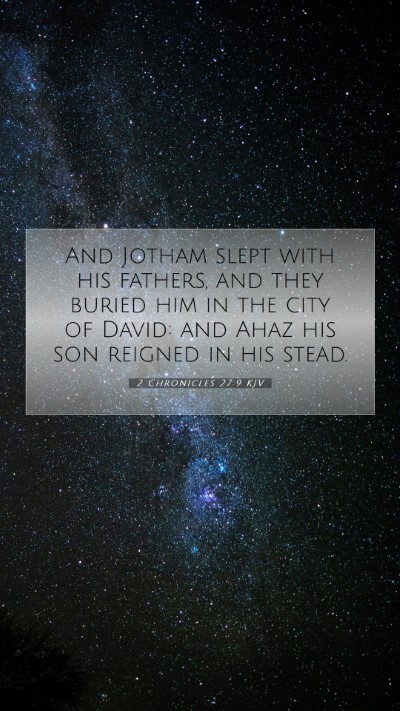Understanding 2 Chronicles 27:9
In this verse, 2 Chronicles 27:9, we encounter the closing notes of the reign of Jotham, the son of Uzziah, King of Judah. The verse states:
"And Jotham slept with his fathers, and they buried him in the city of David: and Ahaz his son reigned in his stead."
This passage provides significant insights into the continuity of leadership within the kingdom of Judah and sets the stage for Ahaz's forthcoming reign which was markedly different from his father’s.
Bible Verse Meanings
The primary meaning conveyed in this verse emphasizes the reality of mortality and the legacy that rulers leave behind. Jotham's death signifies a transition in leadership and the cyclical nature of kingship.
Bible Verse Interpretations
- Historical Context: Jotham was known for his righteous reign, and his death opens the door to contrasting leadership under Ahaz, who strayed from righteous paths.
- Spiritual Significance: The burial of Jotham "in the city of David" holds symbolic importance, as it links the leadership lineage to the heritage of David and the promises made to him.
- Divine Justice: The verse subtly reminds us of the consequences that can arise from disobedience, tying into the larger Biblical narrative of Israel's history.
Bible Verse Commentary
Several theologians provide valuable commentary on the verse:
- Matthew Henry: Highlights the importance of Jotham's character and reign, noting his efforts in repairing the damage done by his father Uzziah’s pride. He emphasizes that despite his successes, often the continuation of righteousness can be jeopardized, as seen in Ahaz's reign.
- Albert Barnes: Points out the significance of the transition in kingship and how the kingdom of Judah was poised for challenging times ahead due to Ahaz's impending actions.
- Adam Clarke: Reflects on the implications of being buried in the city of David, adding depth to the understanding that the location of one's burial signifies the respect and honor of past kings.
Scripture Analysis
2 Chronicles 27:9 serves as a vital link in biblical history, showcasing the theme of succession and the divine plan that unfolds through the generations. The chapter encapsulates the effects of a king's character on the national narrative.
Biblical Exegesis
Exegesis of this verse includes understanding the implications of leadership on a national scale. Jotham’s adherence to God represents a period of stability, yet the shift to Ahaz foreshadows the spiritual decline Israel would soon face.
Bible Study Insights
For study groups focusing on the Book of Chronicles, this verse can be used to discuss:
- Leadership dynamics and their influence on a nation's faithfulness to God.
- The importance of lineage and heritage in biblical history.
- Comparative analysis between Jotham and Ahaz to highlight the consequences of faithlessness.
Cross References
- 2 Kings 15:34-35: This passage also reflects on Jotham's reign and his accomplishments.
- 2 Chronicles 26: Discusses the reign of Uzziah, Jotham's father, and how it sets the stage for Jotham’s rule.
- Isaiah 7:1-16: Relates to the context of Ahaz's reign and the significant events that unfold during his leadership.
Application of the Verse
In contemporary application, understanding the importance of legacy as seen in this verse encourages individuals to reflect on their own leadership roles.
How do our choices affect those who come after us? This verse can serve as a poignant reminder in both personal and communal endeavors.
Conclusion
2 Chronicles 27:9 encapsulates tragic yet profound insights about succession, leadership, and the importance of faithfulness to God. It lays a foundation for deeper understanding in the context of biblical history and the spiritual narratives that continue to shape the beliefs and practices of modern-day believers.


